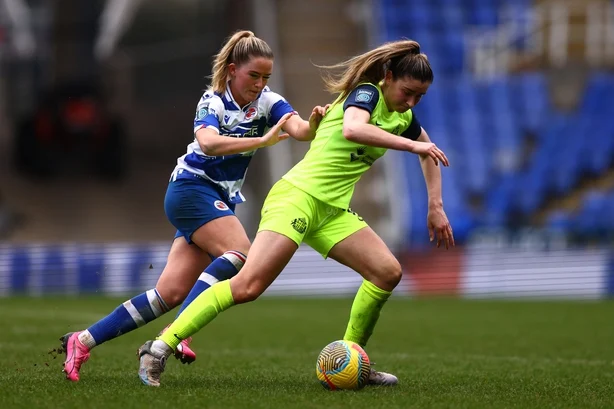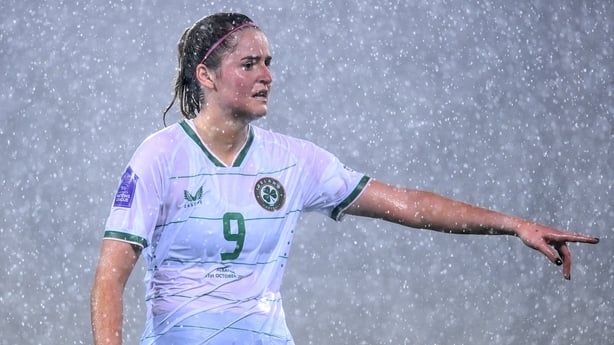It's been a dispiriting week for women's football across the water.
England has been the land of opportunity for generations of Irish footballers - male and female - but the landscape is changing for both.
While Brexit and the hyper globalisation of the Premier League is making it harder than ever for male players to reach the top level cross-channel, the women's game is in a strange growth phase where some clubs are flourishing, and others are dying on the vine.
The Women's Super League has made some tremendous strides forward recently - attendances in the 2023/24 season reached record levels. But you don't have to look too far down the pyramid to see how tough it is to eke out a living.
The Barclays Women's Championship has a large contingent of Irish players - many of them internationals - fulfilling their dreams of playing full-time ball. They're all aware the terrain is fickle and ruthless.
On Sunday, Reading officially pulled out the Championship citing financial issues, dropping down to the fifth tier of the English game, which is essentially amateur football played in regional divisions.
It's been coming; the supporters' discontent with the ownership has been bubbling for well over a year. When Reading got relegated from the top flight in 2023, they went part-time to trim costs. Twelve months later, they've abandoned all efforts to try and field a competitive women's team at a high level.
On Tuesday, the club released 16 players after the expiration of their contracts. Supporters are dejected and enraged, with fan group Sell Before We Dai launching a protest campaign in the town, using billboards to urge owner Dai Yongge to sell the club.

The Republic of Ireland's Jessie Stapleton spent the second half of the last season on loan at the Royals from West Ham. Speaking in April, she was understandably reluctant to get too drawn on a messy situation, but the reality is Stapleton is best off getting away from such as toxic set-up, and she'll head back to the Hammers hoping for fresh opportunities.
On Tuesday, more bad news. The Daily Mail reported that Blackburn Rovers Women (where Tyler Toland plies her trade) plan to pay their players just £9,000 a year this season. That's the UK's miminum wage - £11.44 an hour for anyone aged 21 and over, with 16-hour-a-week contracts which would see the squad train from Wednesday to Saturday and then play matches on Sundays.
Last week, ten players left Blackburn after their contracts were up.
This all comes in the wake of the news that Aoife Mannion and the rest of the Manchester United women's team will have to use temporary cabins at the club's Carrington training ground this year as the men's first-team base gets a £50m upgrade.
Erik ten Hag's players will use the women's and academy building, while the women's team are shunted elsewhere. It's fed a growing feeling that new owners INEOS are not overly interested in the women's team right now as they attempt to resuscitate a bloated, underachieving men's squad.
In Ireland, the SSE Airtricity Women's Premier Division is improving year on year.
Professional contracts were introduced to the league for the first time ahead of the 2023 season, with contracts a minimum of €430 per week full-time and €130 for part-time footballers.
It's a division full of vibrant, ambitious talent, but the step up to the international stage is enormous, and head coach Eileen Gleeson has admitted as much when asked about the lack of home-based players getting game time in the Euro qualifiers.

Gleeson has long mooted the introduction of an Ireland Under-23s team, which would act as a bridge for talented younger players who just aren't physically ready to compete against top-tier countries like England, France and Sweden.
The likes of Erin McLaughlin (Peamount United), Eva Mangan (Cork City) and Ellen Dolan (Peamount United) are shining in the LOI and doubtless eyeing a move to England. There's opportunities there for sure, but it is not the land of milk and honey.
"It's concerning in the immediacy," Gleeson said when asked about the situations at Reading and Blackburn.
"We have players at those clubs and in the broader scheme of things women’s football has grown. There’s still a gap between the top and lower levels, certainly around the financial investment. Reading are in an awful position and I don’t know too much about the Blackburn situation because it only broke (Tuesday) night.
"It’s important that there’s parity for the girls across high performance environment, they’re paid appropriately and standards are kept. We’re seeing some Championship clubs have some really challenging experiences, It’s concerning in that front."
"They are not ready for senior (football), so it is a big conversation that I am in."
On Wednesday, after naming her squad for the Euro qualifiers against England and France, Gleeson was pushed on the lack of recent home-based sessions for LOI players.
"When I came in they were already up for discussion," she said. "The discussion is around the development of the Under-23s and a mechanism for developing those home-based players.
"I think the home-based sessions started out with one purpose, but evolved. It was to facilitate a pathway for players to the senior national team. So it’s just a redesign that is happening and a talent development scheme.
"We’ve got some young, good 19s players, we’ve got some LOI players, but there is no facility for them to have exposure to international football. They are not ready for senior (football), so it is a big conversation that I am in."
The need to join the dots is becoming increasingly pressing.
Disclaimer: The copyright of this article belongs to the original author. Reposting this article is solely for the purpose of information dissemination and does not constitute any investment advice. If there is any infringement, please contact us immediately. We will make corrections or deletions as necessary. Thank you.






